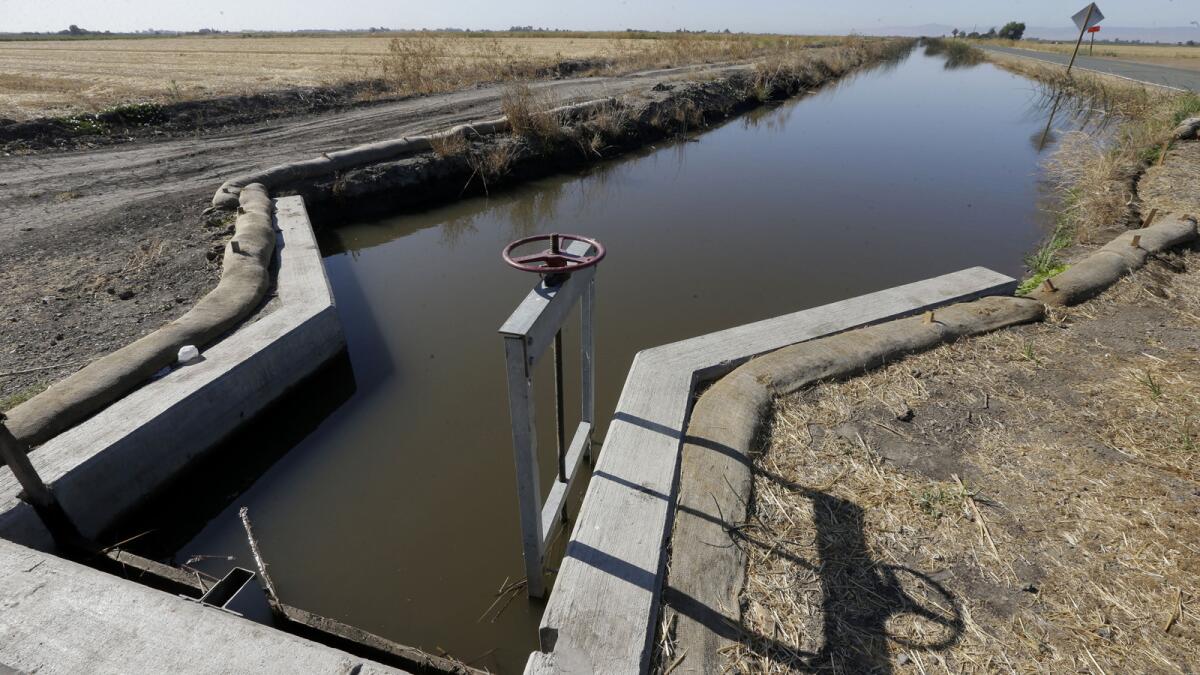State proposes $1.5-million fine of water district for improper diversions

Water flows down a canal near Byron, Calif. The California State Water Resources Control Board said it’s proposing a fine of $1.5 million against the Byron-Bethany Irrigation District.
- Share via
Regulators proposed a record $1.5-million fine Monday against a Northern California irrigation district after it allegedly diverted more than 670 million gallons of water illegally — a rare enforcement action that escalates the legal battle between Gov. Jerry Brown and the state’s oldest water rights holders.
In issuing its draft complaint against the Byron-Bethany Irrigation District, the State Water Resources Control Board signaled a new willingness to confront the state’s senior agricultural water suppliers, many of whom insist that their water rights from 1914 and before are beyond government reach.
At a news briefing Monday, officials said it was “highly likely” complaints against other districts would be issued in the coming weeks.
“We’re doing all the investigations we can and we’ll bring about all the enforcement actions we can,” said Andrew Tauriainen, a prosecutor with the board’s Division of Water Rights.
Under California’s arcane system of water allocation, priority goes to those entities whose rights are the oldest, and special deference is given to those now more than a century old.
“The law dates back to a Wild West society, where the philosophy was, take it, it’s yours,” said Michael Hanemann, a professor of agricultural and resource economics at UC Berkeley. “There was a desire to keep the state government out of water allocation for as long as possible.”
In the face of a severe drought emergency, however, state officials have become more aggressive in enforcing the priority system.
“This is a serious fine that will capture the attention of agricultural water users in the entire state of California,” said Mark Gold, associate vice chancellor of environment and sustainability at UCLA. “The response from the agricultural community is going to be almost as important as the enforcement action.”
In its complaint, the water board accused the Byron-based BBID of diverting water from a California Aqueduct intake channel for nearly two weeks last month, even after the water board issued a June 12 curtailment notice to senior water rights holders whose claims dated back to 1903.
“BBID has made unauthorized diversion of water from the intake channel to the Banks Pumping Plant (formerly Italian Slough) during the most extreme drought in decades, when there was insufficient water supply available for BBID’s claimed water right,” regulators wrote.
The irrigation district supplies water to about 160 growers, as well as 15,000 residents in the master-planned community of Mountain House. It serves an area of roughly 45 square miles in Alameda, Contra Costa and San Joaquin counties and has a “priority date” of May 1914 — making it among the most junior of the state’s senior water rights holders.
The district released a statement Monday that accused the water board of retaliating against it for joining a handful of other water suppliers in suing the board when it issued the curtailment order.
“The State Board is choosing to make an arbitrary example out of BBID at the expense of our customers and the communities their hard work supports,” said Russell Kagehiro, president of the irrigation district’s board. “BBID will vigorously defend its rights to water and due process.”
In a previous statement, irrigation district officials called the curtailment order “nothing short of catastrophic.” BBID officials said it would “strangle family farms, kill vital crops, compromise thousands of livestock, raise consumer prices, destroy thousands of jobs, and ultimately eliminate the ability to farm the land.”
The district stopped diverting water from the intake channel June 26, according to the water board’s complaint, but gained an “economic advantage over other legitimate water diverters” during the time it did take the water.
The irrigation district can request a hearing before the state water board. If the district does not request one within 20 days, the board would adopt the order, officials said.
The board can fine water rights holders up to $1,000 a day and $2,500 per acre-foot of diverted water for violating curtailment orders. Tauriainen said the maximum penalty for Byron-Bethany’s alleged transgressions could have totaled about $5 million, though the recommended fine is only $1.5 million.
“I do expect the board to take a very, very close look” at the case, Tauriainen said. “I wouldn’t be surprised if the board came up with a much higher penalty than is proposed here.”
Last year, a California appeals court strengthened the board’s position when it upheld its authority to determine whether senior water rights holders are using their water in reasonable — and therefore legal — ways, said Barton H. “Buzz” Thompson, a professor of water law at Stanford University.
Therefore, the water board “clearly has some” authority over senior water rights holders, Thompson said.
But the question is: How much?
“The state has a strong argument,” Thompson said. “But we are in new territory now.”
Twitter: @montemorin
Twitter: @bymattstevens
More to Read
Sign up for Essential California
The most important California stories and recommendations in your inbox every morning.
You may occasionally receive promotional content from the Los Angeles Times.












